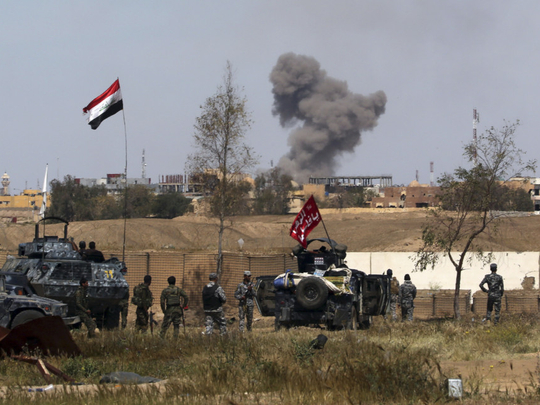
Baghdad: Iraqi forces retook several areas north and west of Ramadi as efforts to close in on the Al Anbar provincial capital seized by Daesh in May intensify, officials said Wednesday.
An operation involving 2,000 troops backed by air strikes from the US-led coalition led to the recapture of several neighbourhoods from Daesh.
A brigadier general from the Al Anbar operations command said those included Zankura, Albu Jleib, Al Adnaniyah and parts of Al Bu Risha and an area known as Kilometre 5.
“The Iraqi security forces also took control of the main road west of Ramadi and they are now using it to support the forces positioned to liberate Ramadi,” Adhal Fahdawi, a member of the provincial council, said.
Meanwhile, Iraq may request Russian air strikes against Daesh on its soil soon and wants Moscow to have a bigger role than the United States in the war against the militant group, the head of parliament’s defence and security committee said on Wednesday.
“We might be forced to ask Russia to launch air strikes in Iraq soon. I think the upcoming few days or weeks Iraq will be forced to ask Russia to launch air strikes and that depends on their success in Syria,” Hakim Al Zamili said.
Iraq’s government and powerful Iranian-backed militias question the United States’ resolve in fighting Daesh militants, who control a third of the country, saying US-led coalition air strikes are ineffective.
Russian air strikes against the government’s opponents in Syria have raised hopes in Baghdad that Russia could become an effective partner against the ultra-hardline group.
“We are seeking to see Russia have a bigger role in Iraq... Yes, definitely a bigger role than the Americans,” Al Zamili said.
Russia’s intervention in the Middle East, including a new security and intelligence-sharing agreement with Iran, Iraq and Syria, has raised concerns in Washington that its former Cold War enemy is gaining clout in the oil-producing region.
“We believe that this centre will develop in the near future to be a joint operation command to lead the war against Daesh in Iraq,” said Al Zamili. According to the US-led coalition’s daily tally of air strikes in Iraq and Syria, a total of 27 strikes have been conducted in the Ramadi area since the start of October.
“The coalition’s air support has played a big part in this progress,” Fahdawi said. “If operations continue at this pace, I expect the liberation of Ramadi to be possible by the end of the month.”
Ahmad Al Assadi, spokesman for the Hashed Al Shaabi paramilitary organisation also involved in the operation, even predicted it would happen “in the next few days”.
Iraqi officials, including Al Assadi and Prime Minister Haider Al Abadi, had said immediately after Daesh fighters blitzed the security forces out of Ramadi in mid-May that a reconquest would be a matter of days.
The Iraqi forces’ advance has been sluggish however, sparking mounting criticism of the US-supported effort to train and equip Iraqi fighters in Anbar.
Colonel Steve Warren, the Baghdad-based spokesman for the coalition, admitted last week that the Ramadi operation had essentially been on “pause” for some time.
He said that the sheer amount of improvised explosive devices laid by Daesh around Ramadi had required extra training and added that US advisers on the ground were now encouraging Iraqi generals to complete the task of retaking the city.
“We are all urging them to begin with the utmost haste to finish this fight in Ramadi,” he said. “It’s a very important fight and it needs to be finished.”












